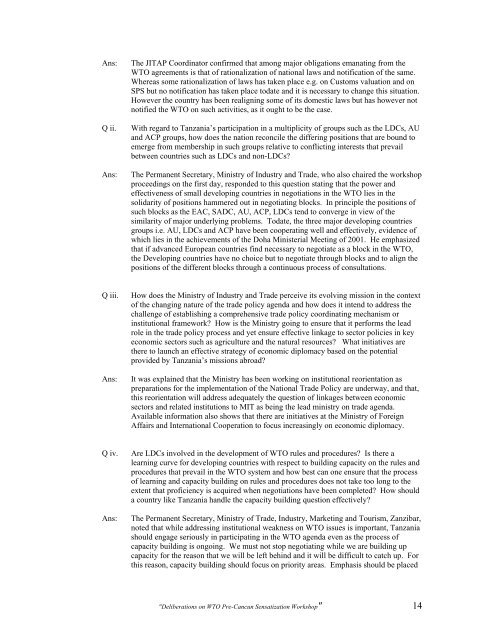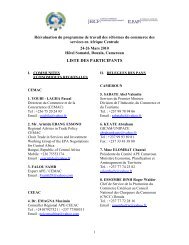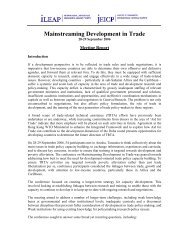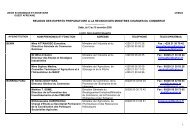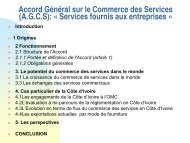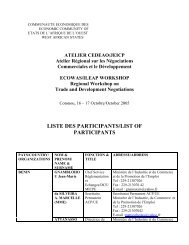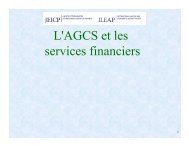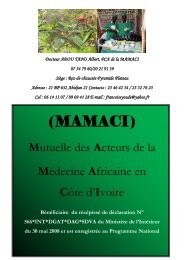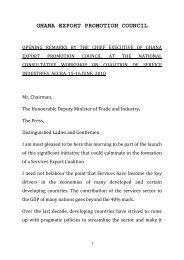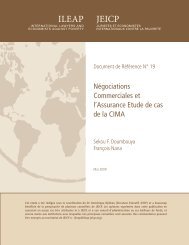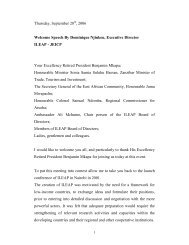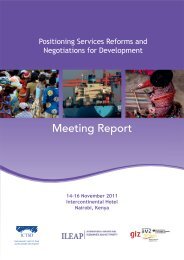Tanzania Report, Dar-Es-Salaam, Tanzania - ILEAP
Tanzania Report, Dar-Es-Salaam, Tanzania - ILEAP
Tanzania Report, Dar-Es-Salaam, Tanzania - ILEAP
You also want an ePaper? Increase the reach of your titles
YUMPU automatically turns print PDFs into web optimized ePapers that Google loves.
Ans:Q ii.Ans:The JITAP Coordinator confirmed that among major obligations emanating from theWTO agreements is that of rationalization of national laws and notification of the same.Whereas some rationalization of laws has taken place e.g. on Customs valuation and onSPS but no notification has taken place todate and it is necessary to change this situation.However the country has been realigning some of its domestic laws but has however notnotified the WTO on such activities, as it ought to be the case.With regard to <strong>Tanzania</strong>’s participation in a multiplicity of groups such as the LDCs, AUand ACP groups, how does the nation reconcile the differing positions that are bound toemerge from membership in such groups relative to conflicting interests that prevailbetween countries such as LDCs and non-LDCs?The Permanent Secretary, Ministry of Industry and Trade, who also chaired the workshopproceedings on the first day, responded to this question stating that the power andeffectiveness of small developing countries in negotiations in the WTO lies in thesolidarity of positions hammered out in negotiating blocks. In principle the positions ofsuch blocks as the EAC, SADC, AU, ACP, LDCs tend to converge in view of thesimilarity of major underlying problems. Todate, the three major developing countriesgroups i.e. AU, LDCs and ACP have been cooperating well and effectively, evidence ofwhich lies in the achievements of the Doha Ministerial Meeting of 2001. He emphasizedthat if advanced European countries find necessary to negotiate as a block in the WTO,the Developing countries have no choice but to negotiate through blocks and to align thepositions of the different blocks through a continuous process of consultations.Q iii.Ans:How does the Ministry of Industry and Trade perceive its evolving mission in the contextof the changing nature of the trade policy agenda and how does it intend to address thechallenge of establishing a comprehensive trade policy coordinating mechanism orinstitutional framework? How is the Ministry going to ensure that it performs the leadrole in the trade policy process and yet ensure effective linkage to sector policies in keyeconomic sectors such as agriculture and the natural resources? What initiatives arethere to launch an effective strategy of economic diplomacy based on the potentialprovided by <strong>Tanzania</strong>’s missions abroad?It was explained that the Ministry has been working on institutional reorientation aspreparations for the implementation of the National Trade Policy are underway, and that,this reorientation will address adequately the question of linkages between economicsectors and related institutions to MIT as being the lead ministry on trade agenda.Available information also shows that there are initiatives at the Ministry of ForeignAffairs and International Cooperation to focus increasingly on economic diplomacy.Q iv.Ans:Are LDCs involved in the development of WTO rules and procedures? Is there alearning curve for developing countries with respect to building capacity on the rules andprocedures that prevail in the WTO system and how best can one ensure that the processof learning and capacity building on rules and procedures does not take too long to theextent that proficiency is acquired when negotiations have been completed? How shoulda country like <strong>Tanzania</strong> handle the capacity building question effectively?The Permanent Secretary, Ministry of Trade, Industry, Marketing and Tourism, Zanzibar,noted that while addressing institutional weakness on WTO issues is important, <strong>Tanzania</strong>should engage seriously in participating in the WTO agenda even as the process ofcapacity building is ongoing. We must not stop negotiating while we are building upcapacity for the reason that we will be left behind and it will be difficult to catch up. Forthis reason, capacity building should focus on priority areas. Emphasis should be placed"Deliberations on WTO Pre-Cancun Sensatization Workshop" 14


